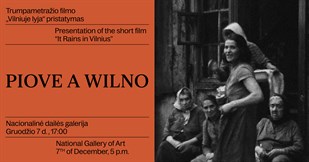NGA Auditorium
27 April, 18:30 a public panel discussion with editors of magazines on visual arts and culture covering the Baltic and Nordic region will take place at the National Gallery of Art.
Find out more >
NDG Auditorija

We invite you to a discussion and presentation of the documentary short film 'It Rains in Vilnius' ("Piove a Wilno") by Giorgio Ruggeri and Ignė Narbutaitė, which is screened at the exhibition "Vilnius, Wilno, Vilne 1918 - 1948. One City - Many Stories". The presentation will take place on 7 December at 5 pm at the Auditorium of the National Gallery of Art.
Find out more >
NGA Auditorium
The curatorial discussion series "No Cutting Corners" invites practitioners and theoreticians of visual art exhibition curation to discuss their methods and strategies, the challenges they face, and the broader contexts of contemporary exhibitions.
Find out more >
NGA Auditorium

The curatorial discussion series "No Cutting Corners" invites practitioners and theoreticians of visual art exhibition curation to discuss their methods and strategies, the challenges they face, and the broader contexts of contemporary exhibitions. Participants of the next talk: Augustas Čičelis, Suza Husse, Laima Kreivytė. Moderated by Agnė Bagdžiūnaitė
Find out more >
Curating queer stories and experiences in the art world involves
a nuanced exploration that goes beyond mere representation. It
demands a critical look at the intentions behind the curation to
avoid falling into the trap of queerbaiting. How does the curator
engage with the queer community to ensure authenticity and respect?
Moreover, can one even say that there is a queer "community", as
opposed to individuals with different expectations and realities?
Are efforts made to showcase not only art that depicts queer themes
but also art created by queer-identified artists? Art institutions
wield significant influence in shaping the narrative around art,
and their actions can either reinforce or challenge societal norms,
so this time we'll be talking about both spaces specifically for
queer people and the integration of their stories into wider museum
programmes.
Agnė Bagdžiūnaitė is an artist, curator and
researcher. She bases her practice and research on the
methodologies of people's history, feminist and queer ethnography
and theory. She has carried out several studies on the labor
history of Lithuania, focusing mainly on women's work stories from
the Soviet time and the nineties. In Kaunas Artists' House together
with friend and curator Edvinas Grinkevičius, Agnė has been working
on the project "Obscene West", the interdisciplinary multifaceted
program of presentations, exhibitions and performances exploring
changes in the cultural context related to sexualities during a
period of social, political and cultural turmoil in Lithuania in
the 90s.
Augustas Čičelis is the curator of the "išgirsti"
space, gallery and the Lithuanian Queer Archive, co-founder,
programmer and coordinator of the 11-year-old Vilnius queer
festival 'Kreivės'. Augustas has a degree in Gender Studies, has
been involved in social and cultural queer and feminist movements
since 2006, acting in the wider field of social welfare, support
and self-expression.
Suza Husse is active within artistic and social
practices nurtured by queer, feminist, anti-racist and decolonial
knowings and methods. Growing up in Dresden in the 'transformation
time' of the 1990s, she was socialized within a white,
hetero-normative post-GDR environment and, as a teenager, within
youth- and countercultures critical of the surrounding neo-liberal
and neo-fascist developments. The critical cohabitation with and
undoing of these influences and their historical continuities, and
the engagement with alternative realities remain an active part of
their work. Since 2012, Suza has been co-shaping the art space
"District / School Without Center Berlin" with an emphasis on
performative and collaborative practices, transdisciplinary
artistic research and pedagogies of political imagination. From
here, in 2018 together with Elske Rosenfeld, they co-initiated the
artistic research project "wild recuperations. material from below"
on intersectional approaches to dissident politics, ecologies and
sexualities that emerged in state socialism. Suza is the co-founder
of the aqueous anti-colonial mythmaking, art and publishing
collective "The Many Headed Hydra" (since 2016).
Dr. Laima Kreivytė is an independent curator,
artist, writer and Associate Professor at the Vilnius Academy of
Arts. She has curated more than 60 exhibitions, including
Lithuanian Pavilion for the 53rd Venice Biennale (2009) and "From
Dusk till Dawn. 20 Years of LGBT Freedom in Lithuania" (2013);
co-curated the new exhibition of the permanent collection of the
National Gallery of Art in Vilnius (2019) and "Unfraimed: Leis,
Tabaka, Rožanskaitė" in Kumu Art Museum, Tallinn (2023-2024).
Kreivytė has edited books and curated exhibitions of Marija Teresė
Rožanskaitė, Kęstutis Zapkus, Jurga Barilaitė, Igoris Piekuras and
Milda Drazdauskaitė among others. She is a founding member of the
queer feminist artists' collective "Cooltūristės". In 2018 Kreivytė
was awarded a Government Prize for Culture and Arts.
The conversation will be held in English.
Entry is free of charge.
Organised by Kultfliuksas and the National Gallery
of Art
Curator Goda Aksamitauskaitė
Graphic designer Ineta Armanavičiūtė
Financed by the Lithuanian Council for Culture


